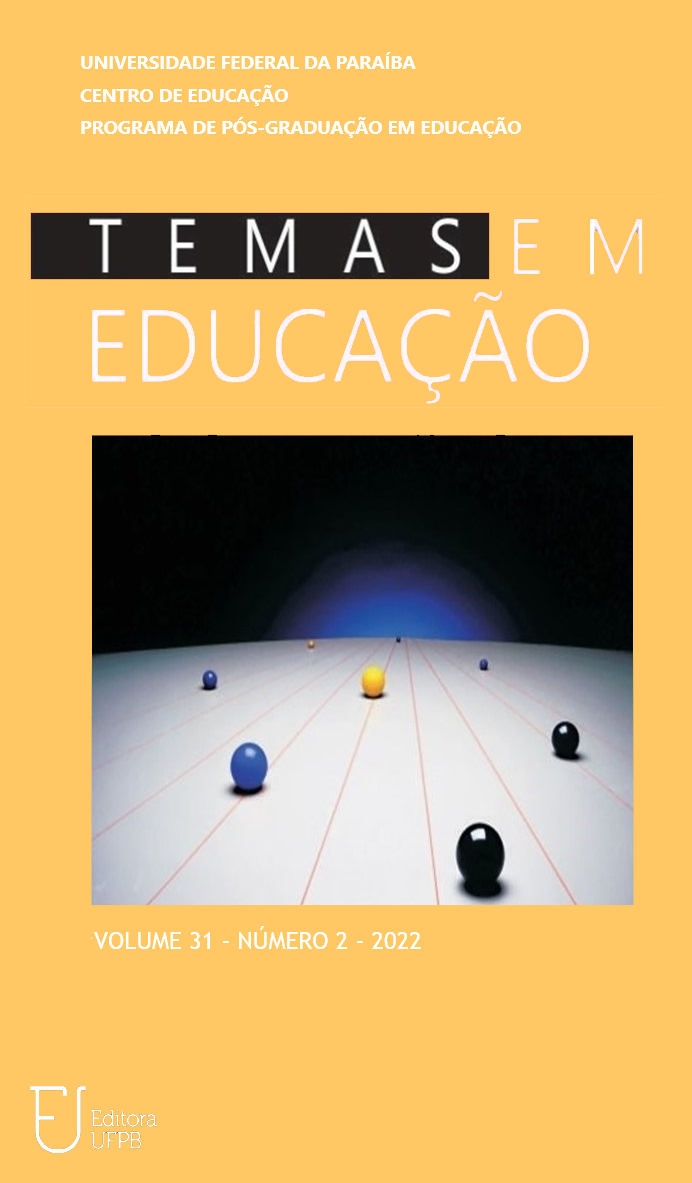CURRICULUM OF FIELD EDUCATION IN THE STATE OF PARÁ IN 2010 AND 2018
DOI:
https://doi.org/10.22478/ufpb.2359-7003.2022v31n2.61514Keywords:
Curriculum. Countryside education. History of Education. Amazon-ParáAbstract
This article consists of a documentary analysis based on the qualitative methodology that started from the guiding question of how the itinerary of rural education curriculum construction took place in the State of Pará from 2010 to 2018? From this, we sought to contribute to the production of significant knowledge and theoretical deepening about this, given that urban models of education do not cover the rural population, and this obstacle is one of several that cause these individuals to lose their social identity. In the meantime, it was essential to emphasize the historical and social relevance of this community by examining the documents: State Curriculum Document (2018) and Resolution 001/2010 CEE PA. Added to this, other theoretical foundations were used to reference the history of the educational curriculum in the field for the construction of curricular justice.
Downloads
References
ARROYO, M. G. FERNANDES, B. M. A educação Básica e o Movimento Social do Campo. Brasília, DF: Articulação Nacional por uma Educação Básica do Campo, 1999. Col. Por uma educação Básica do campo, n. 2.
BRASIL, Ministério da Educação (MEC). Conselho Nacional de Educação (CNE). Resolução CNE/CEB n.1, de 3 de abril de 2002. Instituiu diretrizes operacionais para a educação básica nas escolas do campo. Diário Oficial da União, Brasília, 9 de abril de 2002. Seção 1, p. 32.
BRASIL. Presidência da República. Casa Civil. Decreto n. 7.352, de 04 de dezembro de 2010. Dispõe sobre a política de educação do campo e o Programa Nacional de Educação na Reforma Agrária - PRONERA. Brasília, 2010a. Disponível em:
http://www.planalto.gov.br/ccivil_03/_ato2007-2010/2010/decreto/d7352.htm. Acesso em: 17 maio 2021.
BRASIL. Ministério da Educação. Conselho Nacional de Educação (CNE). Resolução nº 04 de 13 de julho de 2010. Define Diretrizes Curriculares Nacionais Gerais para a Educação Básica. Brasília, 2010b. Disponível em: http://portal.mec.gov.br/dmdocuments/rceb004_10.pdf. Acesso em: 17 maio 2021.
BRASIL. Ministério da Educação. Portaria n. 86, de 1º de fevereiro de 2013. Gabinete do Ministro. Institui o Programa Nacional de Educação do Campo - PRONACAMPO. Diário Oficial da União, Brasília, 4 de dezembro de 2013a. Diário Oficial da União, Brasília, 4 de fevereiro de 2013. Seção 1, pág. 28.
BRASIL. Ministério da Educação. Conselho Nacional de Educação (CNE). Diretrizes Curriculares Nacionais Gerais da Educação Básica. Brasília: MEC, SEB, DICEI, 2013b. Disponível em: http://portal.mec.gov.br/index.php?option=com_docman&view=download&alias=13448-diretrizes-curiculares-nacionais-2013-pdf&Itemid=30192. Acesso em: 17 maio 2021.
BRASIL Presidência da República. Casa Civil. Lei n. 12.960, de 27 de março de 2014. Altera a Lei n. 9.394, de 20 de dezembro de 1996, que estabelece as diretrizes e bases da educação nacional, para fazer constar a exigência de manifestação de órgão normativo do sistema de ensino para o fechamento de escolas do campo, indígenas e quilombolas. Brasília, 2014. Disponível em: https://www2.camara.leg.br/legin/fed/lei/2014/lei-12960-27-marco-2014-778312-publicacaooriginal-143651-pl.html. Acesso em: 17 maio 2021.
FREIRE, Paulo. Pedagogia do oprimido. São Paulo: Paz e Terra, 1974.
HAGE, Salomão; ANTUNES-ROCHA, Maria Isabel (orgs.). Escola de Direito: reinventando a Escola Multisseriada. Belo Horizonte: Autêntica Editora, 2010.
MALDONADO-TORRES, Nelson. On the coloniality of being: contributions to the development of a concept. Cultural Studies, v. 21, n. 2-3, p. 240-270, 2007. Disponível em: https://www.udesc.br/arquivos/ceart/id_cpmenu/5800/MALDONADO_Torres_ON_THE_COLONIALITY_OF_BEING_1550515847301_5800.pdf. Acesso em: 13 dez. 2021
MARINHO, Paulo; DELGADO, Fátima. A curriculum in vocation Courses: the recognition and (re)constrution of counterhegemonic knowledge. The Educational Forum, v. 83, n. 3, p. 251-265, 2019. Disponível em: http://www.researchgate.net/publication/333522323_A_Curriculum_in_Vocation_Courses_The_Recognition_and_ReConstruction_of_Counterhegemonic_Knowledge_SCOPUS. Acesso em: 26 maio 2021.
OLIVEIRA, M. M. Como fazer pesquisa qualitativa. Petrópolis: Vozes, 2007.
PARÁ. Conselho Estadual de Educação. Resolução n. 01 de 5 de janeiro de 2010. Dispõe sobre a regulamentação e a consolidação das normas estaduais e nacionais aplicáveis à Educação Básica no Sistema Estadual de Ensino do Pará. Pará, 2010. Disponível em: http://www.cee.pa.gov.br/sites/default/files/RESOLUCAO_001_2010_REGULAMENTACAO_EDUC_BAS-1.pdf. Acesso em: 13 dez. 2020.
PARÁ. Conselho Estadual de Educação. Documento Curricular para Educação do Estado do Pará. Documento Curricular capaz de orientar as ações educativas no Estado do Pará. Pará, 2018.
TARDIN, José Maria. Cultura camponesa. In: CALDART, Roseli Salete; Pereira, Isabel Brasil; ALENTEJANO, Paulo; FRIGOTTO, Gaudêncio (orgs.). Dicionário da educação do campo. Brasil. São Paulo: Expressão Popular, 2012. p.178-187.
TRAVESSINI, Desideri Marx. Educação do Campo ou Educação Rural? Os conceitos e a prática a partir de São Miguel do Iguaçu, PR. 2015. Disponível em: http://dspace.unilla.edu/handle/123456789/383. Acesso em: 13 dez. 2020.
Downloads
Published
How to Cite
Issue
Section
License
Copyright (c) 2022 Revista Temas em Educação

This work is licensed under a Creative Commons Attribution 4.0 International License.
Authors who publish in this journal agree to the following terms:
. Authors retain the copyright and grant the journal the right to first publication, with the work simultaneously licensed under the Licença Creative Commons Attribution that allows the sharing of the work with acknowledgment of authorship and initial publication in this magazine. . Authors are authorized to assume additional contracts separately, for non-exclusive distribution of the version of the work published in this journal (eg, publishing in institutional repository or as a book chapter), with acknowledgment of authorship and initial publication in this journal.
. Authors are permitted and encouraged to publish and distribute their work online (eg in institutional repositories or on their personal page) at any point before or during the editorial process, as this can generate productive changes, as well as increase impact and citation of the published work (See O Efeito do Acesso Livre).



















